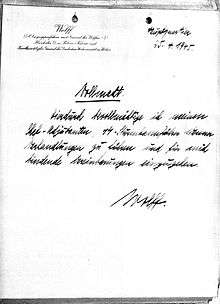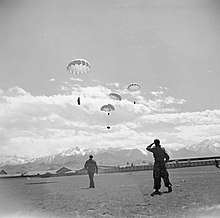Operation Sunrise (World War II)
Operation Sunrise, or the Bern incident, refers to a series of secret negotiations from February to May 1945 between representatives of Nazi Germany and the Western Allies of World War II to arrange a local surrender of German forces in northern Italy.[1] Most of the meetings took place in the vicinity of Bern, Switzerland, and the lead negotiators were Waffen-SS General Karl Wolff and American agent Allen Dulles. The meetings provoked Soviet suspicion that the Americans were seeking to sign a separate peace with the Germans and led to heated correspondence between Joseph Stalin and Franklin Roosevelt, an early episode of the emerging Cold War.[2]

Roosevelt denied that there were any negotiations for surrender taking place in Switzerland. Dulles, however, appears to have made a verbal agreement to protect SS General Wolff from prosecution at the Nuremberg Trials as they worked out details of surrender.[3] Although Switzerland was neutral during World War II, the Swiss intelligence officer Max Waibel and the school director Max Husmann arranged for the meetings.[4] Prime Minister Winston Churchill was following the discussion closely, and said he believed that "misunderstandings" with the Soviets were resolved with Roosevelt's death on April 12. Churchill referred to the negotiations as Operation Crossword, apparently because he found them puzzling.[5][6] In spite of warnings from other officials that he was violating the Casablanca agreement that called for all dealings with Axis members to be on terms of unconditional surrender, Dulles worked supportively with Wolff, determined to end the war before the communists reached Trieste.[4]
President Harry Truman officially closed down talks with the Germans in Switzerland, and made sure that a Russian general was represented at the talks in Caserta, Italy that finalized the surrender of the entire force.[7] Nonetheless, fallout from the incident seems to have discouraged full Soviet participation in the founding United Nations conference later that month.[8]
Events
On 23 February 1945, Dulles accepted Wolff's offer to explore terms of a local surrender. In an 8 March meeting in Lucerne organized by Swiss intelligence officer Max Waibel, Wolff offered the following plan: Army Group C goes into Germany, while Allied Forces Commander Harold Alexander advances in the direction of the South.
On 12 March the U.S. ambassador in the USSR, W. Averell Harriman, notified Vyacheslav Molotov of the possibility of Wolff's arrival in Lugano to conduct negotiations on the German army's surrender in Italy. On the same day, Molotov replied that the Soviet government would not object to talks between American and British officers and the German general, provided that representatives of Soviet Military Command could also take part in them.[7] However, on 16 March the Soviet side was informed that its representatives would not be allowed to take part in negotiations with Wolff in any case. Meanwhile, on 15 and 19 March, Wolff discussed details of how an actual surrender would proceed with American general Lyman Lemnitzer and British general Terence Airey.[9]
On 22 March Molotov, in his letter to the American ambassador, wrote that
for two weeks, in Bern, behind the back of the Soviet Union, negotiations between representatives of the German Military Command on one side and representatives of American and British Command on the other side are conducted. The Soviet government considers this absolutely inadmissible."[5]
This led to Roosevelt's letter to Stalin on 25 March and Stalin's reply on 29 March.[10]

Wolff and his forces were being considered to help implement Operation Unthinkable, a secret plan to invade the Soviet Union which Winston Churchill advocated during this period.[11] Wolff was later proven to be complicit in the murder of 300,000 Jews.[12] On April 26, the SS general was captured by Italian partisans, but was rescued by Dulles' Office of Strategic Services (OSS) and Swiss intelligence.[4]
The actual surrender in Italy was signed on 29 April 1945 agreeing to a cessation of hostilities on 2 May. Wolff justified his actions to Berlin officials by explaining that the agreement had pre-empted "a Communist uprising" in northern Italy. Wolff and his officers were not interned at this time, but instead celebrated the resolution at Gestapo headquarters in Bolzano for several days with Allied commanders. The Americans had to periodically repel partisans who attempted to seize the Germans.[13] Victory in Europe Day occurred on 8 May.
Aftermath
Operation Sunrise was documented in Seventeen Moments of Spring, a Soviet historical TV series, where it was called "Operation Sunrise Crossword".
References
- Donahue, Stephen (2015). "Dulles, Allen Welsh". In Zabecki, David T. (ed.). World War II in Europe: An Encyclopedia. Routledge. p. 287. ISBN 9781135812423.
- Delgadillo, Charles Edward (2013). "Dulles, Allen". In van Dijk, Ruud; Gray, William Glenn; Savranskaya, Svetlana; Suri, Jeremi; Zhai, Qiang (eds.). Encyclopedia of the Cold War. Routledge. p. 271. ISBN 1135923116.
- K., von Lingen. "Conspiracy of Silence: How the "Old Boys" of American Intelligence Shielded SS General Karl Wolff from Prosecution". Holocaust and Genocide Studies. 22 (1). ISSN 1476-7937.
- Lingen, Kerstin von (2013). Allen Dulles, the OSS, and Nazi War Criminals: The Dynamics of Selective Prosecution. Cambridge University Press. pp. 77–80. ISBN 9781107025936.
- Waller, Douglas (2016). Disciples: The World War II Missions of the CIA Directors Who Fought for Wild Bill Donovan. Simon and Schuster. pp. 333–334. ISBN 9781451693744.
- Gilbert, Martin (1986). Winston S. Churchill, Volume 7: Road to Victory, 1941–1945. Heinemann. ISBN 9780795344664. ch 65
- Halbrook, Stephen P. (2006). "Operation Sunrise: America's OSS, Swiss Intelligence, and the German Surrender 1945" (PDF).
- Randell, Sara B. (2018). Ending the war - Operation Sunrise and Max Husmann. Stämpfli Verlag. ISBN 9783727260148.
- Edsel, Robert M. (2013). Saving Italy: The Race to Rescue a Nation's Treasures from the Nazis. W. W. Norton. p. 246. ISBN 9780393082418.
- "Operation Sunrise Crossword". Seventeen Moments in Soviet History. Michigan State University. 2016-01-10. Retrieved 2018-02-20.
- Lingen, Kerstin von (2013). Allen Dulles, the OSS, and Nazi War Criminals: The Dynamics of Selective Prosecution. Cambridge University Press. pp. 6, 256. ISBN 9781107025936.
- Salter, Michael (2007). Nazi War Crimes, US Intelligence and Selective Prosecution at Nuremberg: Controversies Regarding the Role of the Office of Strategic Services. Routledge. pp. 110–119. ISBN 9781135331337.
- Smith, Richard (2005). OSS: The Secret History of America's First Central Intelligence Agency. Rowman & Littlefield. pp. 110–114. ISBN 9781599216584.
- Bradley F. Smith and Elena Agarossi, Operation Sunrise: The Secret Surrender. New York, 1979
- "Analysis of the Name File of Guido Zimmer". Records of the Central Intelligence Agency - Records of the Directorate of Operations. Retrieved September 10, 2006.
- "Insidious Moments of the Victorious Spring". Soviet Russia (in Russian). Archived from the original on October 28, 2006. Retrieved September 10, 2006.
- "They Are Honest and Modest People..." SVR (in Russian). April 15, 2000. Retrieved May 15, 2019.
- Stephen P. Halbrook: Operation Sunrise Retrieved 2011-12-26
- CIA: OSS Secrete Intelligence Branch and Operation Sunrise Retrieved 2011-12-26
- Operation Sunrise chapter in "From Hitler's Doorstep - The Wartime Intelligence Reports of Allen Dulles 1942-1945" Retrieved 2011-12-26
- Rossé Christian, Guerre secrète en Suisse, 1939-1945, Paris, 2015, p. 134.
- Sara Randell: Ending the War, Operation Sunrise and Max Husmann, Stämplfi Verlag, Bern 2018